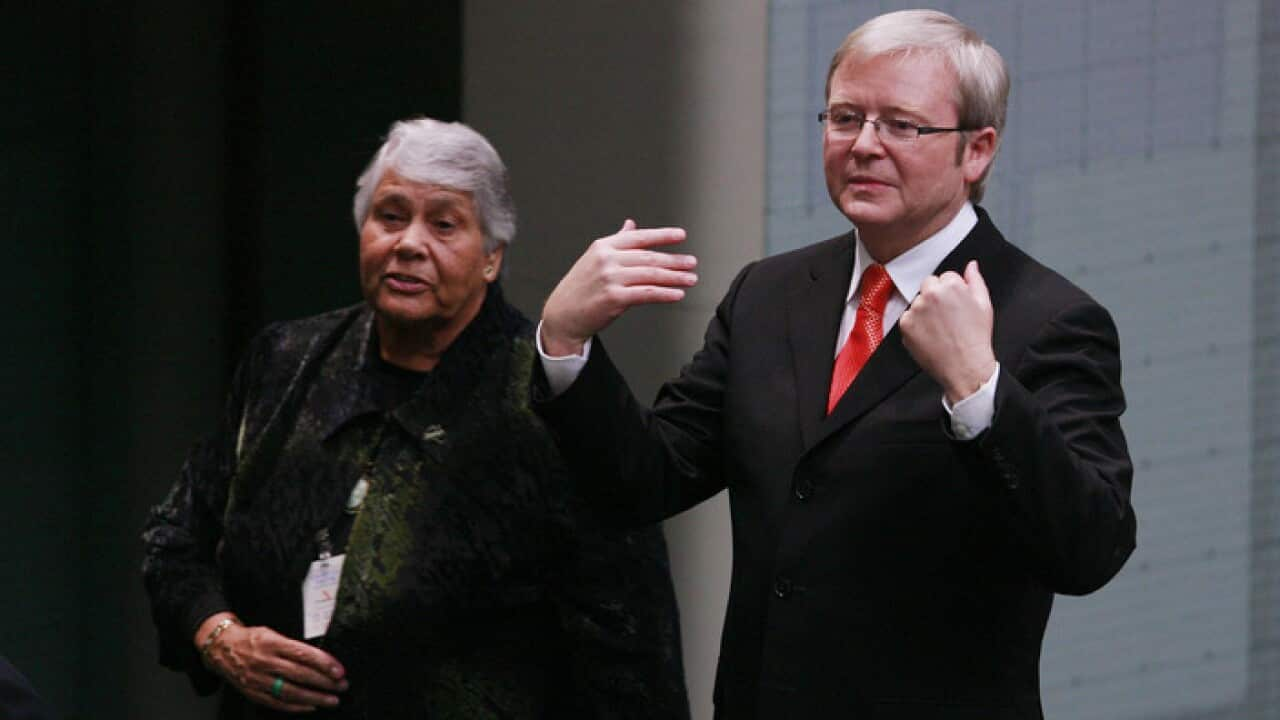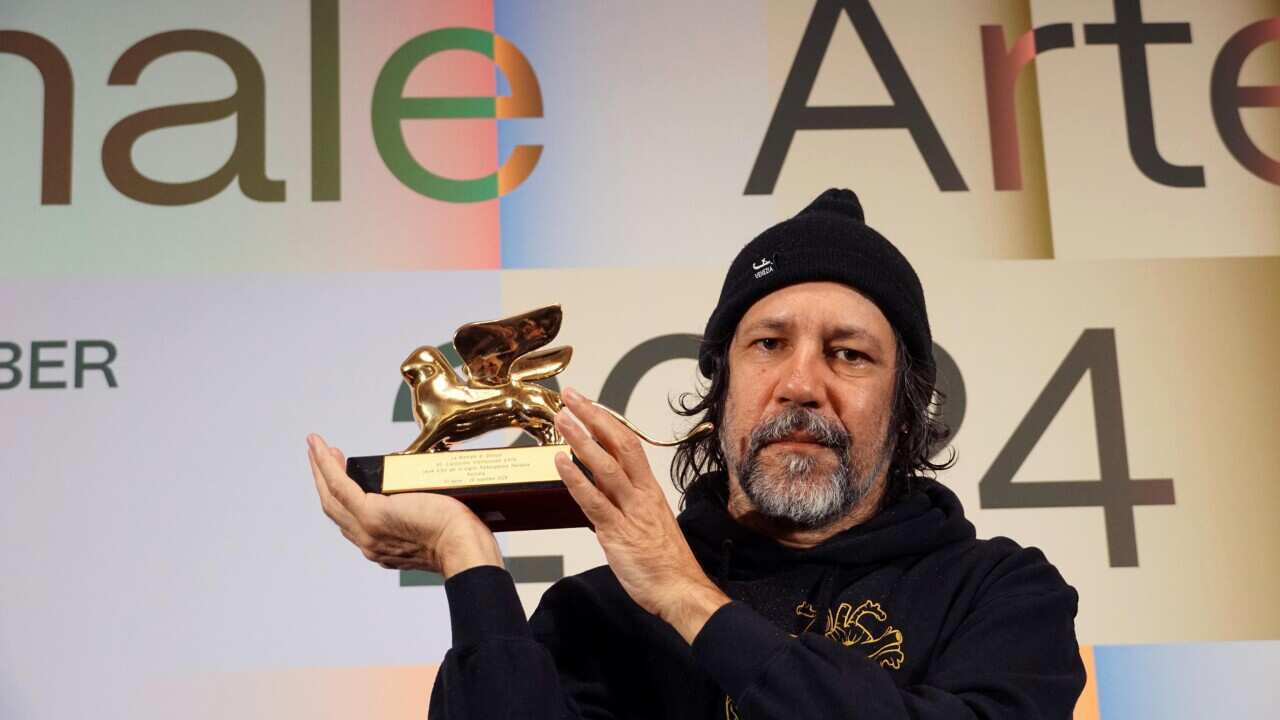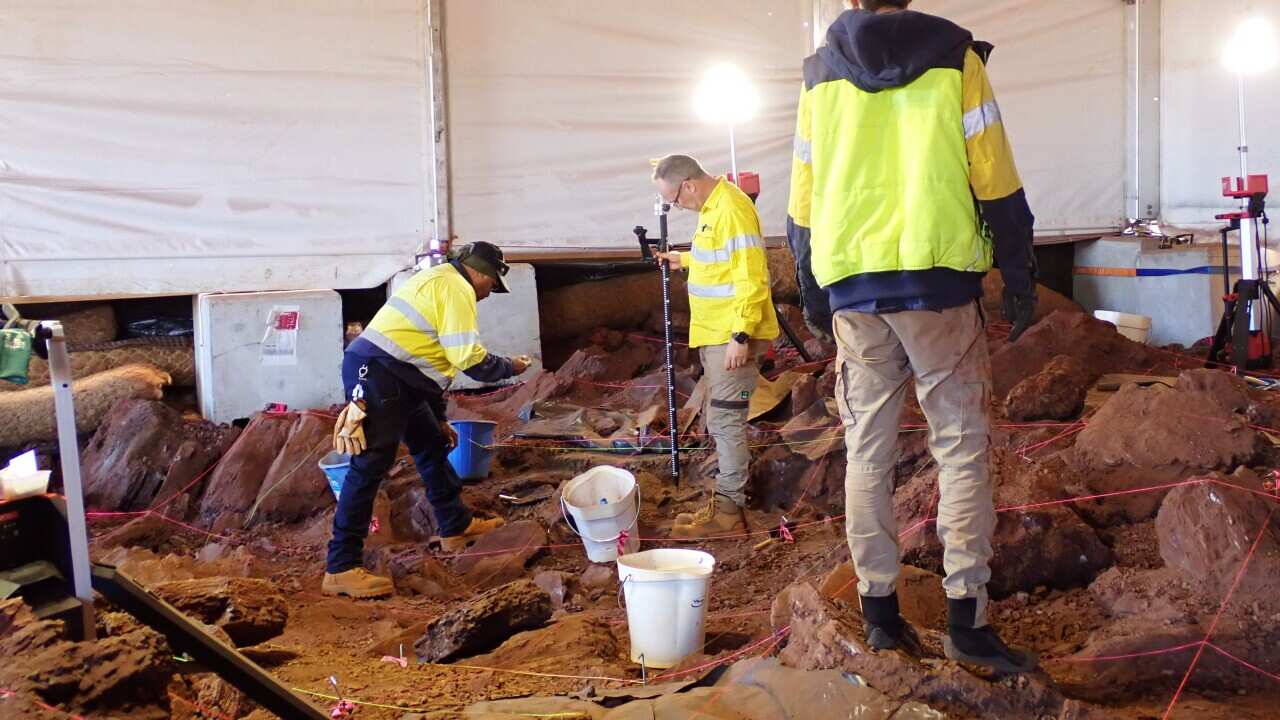"To the Stolen Generations, I say the following: as Prime Minister of Australia, I am sorry. On behalf of the government of Australia, I am sorry. On behalf of the parliament of Australia, I am sorry. I offer you this apology without qualification."
They were the words thousands of Indigenous families had waited decades to hear.
It was 2008 and Prime Minister Kevin Rudd had done what no other leader before would do - he said sorry to members of the
The overdue acknowledgement came as a monumental relief to many survivors. "We cry together, we laugh together, we hug one another, we say don't we have a wonderful country that we can look forward to a greater future," one Stolen Generation member said at the time
"We cry together, we laugh together, we hug one another, we say don't we have a wonderful country that we can look forward to a greater future," one Stolen Generation member said at the time

Source: AAP
"We can now walk away from here feeling that we are respected, and on the other hand we can go away from here with a little bit more respect from Parliament," said another.
Long and painful journey
But the journey to this point was fraught and hard fought by survivors and their supporters.
It was in 1992 when Paul Keating brought it to national attention. In his landmark Redfern Speech, Mr Keating admitted white Australia removed Aboriginal children from their families.
It [The Stolen Generations] was arguably the most damaging thing to happen to Aboriginal communities since colonisation.
"We took the traditional lands and smashed the traditional way of life. We took the children from their mothers," he said.
It was the first time a Prime Minister made such an admission.
"We practised discrimination and exclusion. It was our ignorance and our prejudice."
Michael Lavarch was the Attorney-General under the Keating Government. He was the man who triggered a in response to, what was then, the Human Rights and Equal Opportunity Commission.
"It was the thing that Australia needed, it was a milestone event," he told NITV News.
"It [The Stolen Generations] was arguably the most damaging thing to happen to Aboriginal communities since colonisation," he said.
Under government policy, Aboriginal and Torres Strait Islander children were forcibly removed from their families. From the early 1800s until the 1970s, thousands of Indigenous children were taken, for their own protection.
It is hard to determine the exact number of removals: "The best estimates that could be worked through at that time was that a minimum of 10 per cent of Aboriginal children were removed... it could've been as high as 30 per cent", said Mr Lavarch.
These people weren't just stolen, they were lost.
The removal regime left generations of families scattered and traumatised.
As the years progressed, states and territories began to repeal their legislation, and during the 1980s and 1990s Link-Up organisations were esbtalished to help reunited families and provide support.
Then in 1995, Professor Mick Dodson, the then Aboriginal and Torres Strait Islander Social Justice Commissioner, was put in charge of the National Inquiry.
"It was pretty traumatic for people reliving and telling us in great detail the horrible things they went through," he told NITV News. "These people weren't just stolen, they were lost. They had huge identity problems. You put it in black and white terms, really - they couldn't fit into either camps, they were rejected by the whites and rejected by the blacks," he said.
"These people weren't just stolen, they were lost. They had huge identity problems. You put it in black and white terms, really - they couldn't fit into either camps, they were rejected by the whites and rejected by the blacks," he said.

SBS Source: SBS
For two years, Professor Dodson and former Human Rights Commissioner, the late Sir Ron Wilson, listened to thousands of heartbreaking stories from around the country.
"They never had their opportunity prior to that be officially heard - I think that was something people really appreciated. Here was the Federal Government saying 'yes we believe what happened to you and we're gonna listen'," Professor Dodson said.
He said heading up the National Inquiry was one of the toughest things he's ever done.
"There was no family untouched by the policies, by the practice - it affected everybody," he said.
Many people were involved in the work of the National Inquiry. A team of Indigenous co-commissioners from around the nation were recruited to assist in the challenging task.
National Congress Co-Chair, Dr Jackie Huggins, represented Queensland.
"It was very hard, some of those testimonials were very painful to listen to," Dr Huggins told NITV News.
"I remember Mick Dodson saying one day 'this is the first day I haven't cried' as he went around the country, this was in Brisbane, and believe me by the end of the week we we're all crying," she said.
Dr Huggins said hearing the story of survivors was 'incredible.'
"It opened up a can of worms that was out there and the silent history that had existed for far too long," she said.
"I think the message in that is, 'how would you feel if your child was ripped from your arms, taken away and you never saw them again."
Bringing Them Home
On 26 May 1997, two years after the National Inquiry was called, the landmark Bringing Them Home report was tabled in Federal Parliament.
The report finally recognised the 'strength and struggle of many thousands of Aboriginal and Torres Strait Islander people affected by forcible removal.'
It marked a pivotal moment in the healing journey of many Stolen Generations members.
"The really powerful aspect of the Bringing Them Home report was about the personal stories, the narratives of individuals, of children who were taken, of their families, of their extended families," said Michael Lavarch.
"I think that's what changed Australia, was hearing first-hand, from those who were affected by the policies."
Mr Lavarch said the National Inquiry and the report began to open up a national dialogue.
"It was starting to seep into the national conscience that there was a Stolen Generation, that this was a deliberate policy of Australian governments, that the broader community was quite happy for this to occur or least operated in broad ignorance that it was occurring," he said.
But the government didn't listen to the report. Then Prime Minister John Howard rejected the findings, and refused to apologise to members of the Stolen Generations.
"I have a different attitude from the Labor Party in relation to a formal apology. My view has not changed, and it will not change," Mr Howard said in 1997.
Jenny Macklin was the Indigenous Affairs Minister at the time of the National Apology. She reflects in ' about Howard's refusal.
"It was clear Howard would not apologise to the Stolen Generations on behalf of the nation. In a now famous act of anger and protest—an act that would singularly define and shape his future relationship with Indigenous Australians—those attending silently turned their backs on him," she writes.
Dr Huggins said tensions were high around government at the time. "I remember clearly May O'Brien and Sadie Canning, who were two elders on the Council for Aboriginal Reconciliation, saying to John Howard in our boardroom, 'will you please reconsider your apology to the Stolen Generations, Mr Howard?' And he just looked at them blankly," she said.
"I remember clearly May O'Brien and Sadie Canning, who were two elders on the Council for Aboriginal Reconciliation, saying to John Howard in our boardroom, 'will you please reconsider your apology to the Stolen Generations, Mr Howard?' And he just looked at them blankly," she said.

Source: AAP
"It was just such a gut-wrenching feeling that their voices, they were both Stolen Generation children, were not listened too."
"I think he had an opportunity to not just show some leadership but to unify the country and he failed that, failed it badly," said Professor Mick Dodson.
Professor Dodson says there were still many people who denied that the Stolen Generations happened, even after the National Inquiry.
"People in powerful places denied it, that wasn't just tough it was very, very sad that other Australians were saying it didn't happen and here we were sitting there getting firsthand accounts that it did happen," he says.
"It wrecked people's lives, too many lives were absolutely ruined by this silly, stupid policy and practice and they had laws to back it up."
It would take another ten years, and a new leader, to begin to make amends.
In 2008, Prime Minister Kevin formally apologised to members of the Stolen Generations and their families.
Ms Macklin, the-then Indigenous Affairs Minister, remembers the lead-up to the day of the Apology.
"The delivery of the Apology was already being discussed a few days after the election. I thought it should be given on the first day of the new Parliament as a powerful way to begin a new chapter," she reflects in her recent Meanjin essay.
"I thank Kevin for that, I thank him for the deed that he did, and the great gift that he gave to our people across the nation," says Dr Huggins.
Mick Dodson says the anniversary of the National Apology belongs to the survivors.
"It's their day.... we can all remember in our own way and hopefully they cannot just remember but celebrate the fact that they've gotten through it, albeit not unscathed but they got through it," he said.
New generation at risk
But Kevin Rudd's apology was just one step in the journey.
Of the 54 recommendations in the Bringing Them Home report, only a handful have been implemented. There is still unresolved trauma to be addressed, further compensation to be paid, and now ten years on, many fear a new generation is at risk.
Dr Jackie Huggins says the rate of Indigenous child removals today is a national disgrace.
"Overwhelmingly, the disproportion of Aboriginal and Torres Strait Islander kids in care is just a national disgrace, it's a crisis," she said. "The statistics don't lie and they tell us something is terribly wrong."
Dr Huggins says the dramatic rise of removals is due to the 'government's inability to to come to terms of with a problem that is so massive.'
"They tend to put in the 'too hard basket' all the time. They work in silos; they're not able to have an engaged or meaningful relationship with our mob and communities. And that is why we are so pressed and so encouraged by the Redfern Statement which we've asked governments to listen to our people, because we have the solutions," she said.
Michael Lavarch says the nation must act.
"We must confront and we must change it," he says.
"By 2025, if something is not done very deliberately, very dramatically and the trend continues we will be back at exactly the same levels of Aboriginal children being removed from their families as we had when it was formal government policy."
Mr Lavarch says 'it is absolutely appalling that had has occurred in this country and continues to occur, we must confront and we must change it."











